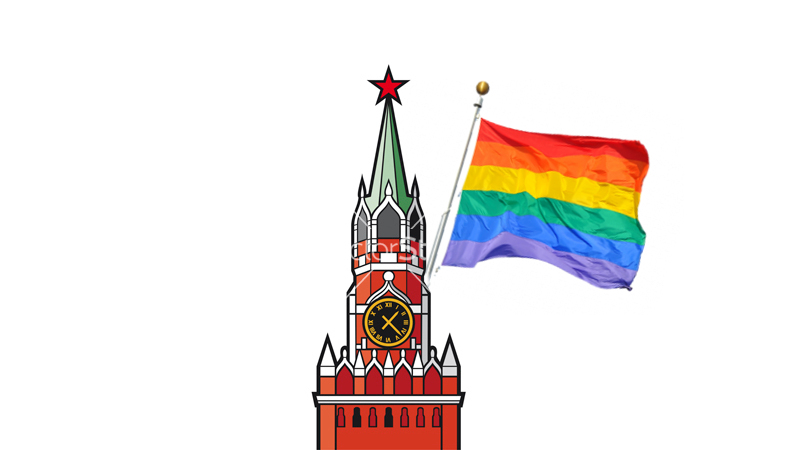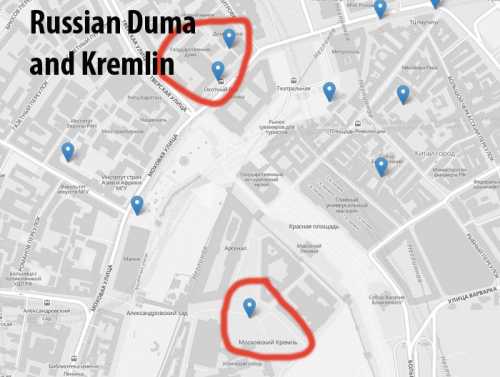
Images mixed by Tetyana Lokot.
Facing a panel of human rights activists last December, Vladimir Putin awkwardly defended Russia’s notorious legal ban on homosexual “propaganda.” While admitting that human rights abuses had occurred, he argued that the law was part of Russia’s “strategic choice” to protect traditional relationships, and that a “balanced approach,” where people neither “bother” nor “exclude” each other, is best for Russia.
As “balanced” as Putin purports the Kremlin’s policy to be, it has set off a wave of anti-LGBT sentiment in Russia. Discrimination and hate towards the LGBT community have skyrocketed following the adoption of the 2013 law, which human rights activists have called out for having intentionally “broad and vague wording” and for “violating right to freedom of expression.” A single web search will show that Russia’s LGBT community has a wide and thriving presence online, but what it won't reveal is that the Internet is quickly becoming a battleground in the Kremlin and Russian conservative lobby’s assault on the LGBT community.
Origins and Successes
The legalization of homosexuality in 1993 and the advent of the Internet contributed to an explosion of gay dating and social networks in Russia. Gay online websites provided an opportunity for LGBT individuals to be part of a community while being relatively free from pressure to publicly identify themselves and from the threat of homophobic violence.
Today, a large variety of LGBT dating sites exists, with both Russian and foreign websites widely used by the community members. While enclaves within St. Petersburg and Moscow provide safe public spaces, in smaller and/or more socially conservative cities the Internet may be the only connection people have to the broader LGBT community in Russia. Though some Russians have reported that these dating sites are not worth the time and effort, the sites continue to be popular in Russia, with some sites like qguys.ru hosting nearly 300,000 active profiles.
Dating apps like Grindr are also popular, although they often come with privacy issues: in 2014, after a flaw in the Grindr location feature was exposed, a blogger reported locating many Grindr users within Russia, including several active Grindr profiles within the Kremlin itself.

Grindr in the Kremlin, where several active profiles were spotted by a concerned activist. Image from http://americablog.com/.
Even more encouraging has been the grassroots effort to build online support networks for LGBT youth. The most famous of these is Дети-404 (Children 404), with 404 being the error code for an invalid or non-existing URL—a play on the state's attitude towards ‘invisible’ LGBT teenagers. The group posts harrowing and inspirational accounts from gay teens struggling to find their identity in unaccepting environments. Even outside of official groups, certain teens have found support in unrelated cultural interests. The alternative music scene in Russia has been known to be tolerant towards LGBT youths, and other teenagers have found support through a shared interest in anime.
Challenges and Dangers
For all that the RuNet has given rise to communities of support, it has also become a tool for increasingly violent and invasive anti-LGBT crimes. As profiled by the BBC, Human Rights Watch, and Children-404 itself, vigilante groups have begun to use Internet dating sites to lure LGBT individuals, almost always gay men, into dangerous circumstances under the pretense of going on a date. Once isolated, the groups verbally and physically abuse their victims (and in extreme cases murder them), and post videos of these acts to social media sites and anti-LGBT websites. Though some of these groups have been removed or banned, others have as many as 170,000 members, and their videos receive tens of thousands of views.
While violence and harassment of homosexuals in Russia is not exactly new, this new brand of vigilante groups is a direct outgrowth of Russia’s recent anti-homosexual propaganda ban. The law, which purports to ban “the propaganda of non-traditional relationships among minors,” conflates homosexuality and pedophilia to such a degree that most Russian hate groups directly equate the two. The largest of these groups is Occupy Pedophilia, whose members use the words pedophilia and homosexuality interchangeably, and brag of protecting Russia’s youth from pedophiles through their homophobic assaults. In addition, the law’s vague distinction between private and public expression of sexuality has permitted these vigilante groups to exploit the private online lives of Russia’s LGBT community.
Russian law enforcement has only compounded the problem by turning a blind eye to the reports of beatings and abuse. As reported by Human Rights Watch, Russian police consider beatings to be justified if the victims have outwardly expressed homosexual affiliation. If the assailants are even questioned, they can in turn claim that the victim had identified himself as homosexual or had come on to them, which constitutes a legitimate legal defense. As a result, the vast majority of hate crimes towards LGBT youth go unpunished, and it becomes next to impossible to collect reliable statistics on abuses suffered by LGBT groups and individuals.
Despite the hundreds of videos portraying acts of violence committed towards LGBT individuals, some Russian lawmakers remain in denial. Vitaly Milonov, author of the St. Petersburg LGBT legislation that served as a precedent for the national law, stated that he believes the posted videos to be “false information,” and that all gays are pedophilial “rapists” and perpetrators of “much more violence” than heterosexuals in Russia.
Apart from the explicit violence of vigilante groups, the Internet has increasingly become a tool for targeting the livelihoods of LGBT or pro-LGBT individuals teaching and working with children. Anti-LGBT activists typically start by identifying LGBT and LGBT-allied users through online photos or social media profiles. These photos and personal information are then distributed in online smear campaigns, encouraging parents to file threatening complaints to the target’s employer. These tactics have been used by a number of online groups, most notably Parents of Russia. Claiming to protect their children, the group openly aims to remove all LGBT and pro-LGBT teachers working in Russia. So far, their tactics have proven to be effective. Timur Isaev, the leader of Parents of Russia, recently admitted to getting 29 teachers fired through online smear campaigns. For Russian school teachers this means any association with gay rights (no matter if they themselves are gay or if their views are privately expressed online) can be grounds for dismissal.
Not only does the Russian government condone such activities, but it too has targeted LGBT groups online. Most notably, the aforementioned Children 404 support group has been formally charged and sentenced under the gay propaganda law for its support of LGBT youth. Even though medical issues sidelined the group’s attorneys from the trial, judges refused to postpone the trial and now the online group will likely be shut down. In another incident, 75,000 users of a Russian dating app during the Sochi Olympics were blocked by hackers and received notifications that they were in violation of Russian law and at risk of arrest.
The Grim Outlook
Though Putin and the Kremlin may be content to defend their “balanced” approach to homosexuality, the consequences of the implemented legal norms and their crude enforcement are open discrimination and hate. Although the Internet had become a seemingly secure private space for Russia’s LGBT community, the Kremlin has unleashed a wave of hate that has struck deep into the fragile core of the group's private online sphere. Though safe enclaves within major cities may continue to exist in Russia, the continuing homophobia and increasing government control of the Internet pose a growing threat to the web as one of the main lifelines of Russia’s LGBT community and one of the few remaining spaces for free expression.








5 comments
Great article by Lewis May!
According to Pew survey, Russia is the most homophobic country in its European region sample: http://www.pewglobal.org/2013/06/04/the-global-divide-on-homosexuality/
However, the systemic nature of Russian homophobia pervades even its news *about* attacks on members of the Russian LGBT community, as was evident in the conviction of a Khabarovsk newspaper for publishing information about the persecution of a local gay teacher: http://pulitzercenter.org/reporting/russia-khabarovsk-homosexual-propaganda-law-action-homophobia-LGBT
And now, Russia is exporting its homophobic interpretation of “traditional values” to the world:
– “Russia’s traditional values initiative result in abuse at domestic level”: http://nhc.no/no/nyheter/Russia%E2%80%99s+traditional+values+initiative+result+in+abuse+at+domestic+level.b7C_wlnKY2.ips
– Human Rights Watch: “‘Traditional Values’ code for human rights abuse?”:
http://www.hrw.org/news/2012/10/17/traditional-values-code-human-rights-abuse